#not to mention just what a poor framework it is for. Anything
Explore tagged Tumblr posts
Text


#I'm starting to better understand like. That people like this are deeply embedded in a culture that has nothing to do with me#and by and large very little to do with the majority of actual functioning adult gay people#but this stuff is still just such an eye roll for me. I guess because I find all the politics so ridiculous and ineffective#not to mention just what a poor framework it is for. Anything
235 notes
·
View notes
Text
It's tempting to call out evangelicals on grounds of hypocrisy - on ignoring the teachings of their own religion - but to them, it all makes sense, because they've developed a framework that basically amounts to Jesus having no real philosophy
They acknowledge the many verses about caring for the poor etc, but take it either as a code or of lesser importance. It's not about changing society, it's about individual charity, but not about compelling people to be charitable, just that it's nice. When Jesus spoke of the "least" of society, that wasn't about helping marginalized people, that was either about Christians, or about what side to take in the war that happens after the rapture. Simple. You may think "wait, but right before that it mentions caring for the poor, sick, and imprisoned" and their answer is, as I understand it, that you can just read every verse of the Bible in isolation from every other verse and it still makes sense on its own, so it doesn't matter (for reference, the New Testament wasn't split into numbered verses until 1551, when they were decided on by a random Frenchman)
This doesn't make sense on many levels. Anyone outside the sphere would point out that, religion aside, it would be really weird to have a story about someone telling a bunch of people to help the poor and then reveal "actually, it was all about events that will happen thousands of years after everyone present was dead! Nothing that was said matters to you or most people reading this!" Like what's the point. But within the sphere they have so many rationalizations, like how it's taken as writ in evangelical circles that it's okay to be rich because the "Eye of the Needle" was a specific gate in Jerusalem that was merely difficult to get through. Meanwhile, outside their culture, no references to that gate exist, because it didn't exist
One fun strain of this thinking is this

The Good Samaritan is a parable that ends with the directive to "go and do likewise". So clearly, the real point of the story is that you can't do anything. Jesus told everyone to go and do likewise to prove that nobody can ever show the impossible love to...help a guy who got robbed? Because Jesus was perfect, all advice from Jesus can be disregarded, because nobody can follow it because they're not Jesus
This idea, that every story Jesus told was just about how nobody can ever be like Jesus, is a thing in those circles and it's such a baffling foundation for a religion. Follow our messiah, who told us to be nice to people, but we know all the secret messages about how all those stories meant we SHOULDN'T be nice to people. Their sacred text is not a guide to living, it's a textbook for the apocalypse and how to go to heaven disguised as a guide to how you should be nice to people and help poor people. But a bunch of well-off white people discovered the secret parts of the Bible absolving them of the responsibility to care about people, so
507 notes
·
View notes
Text
OnK Chapter 150
Honestly, the naive part of me wants to believe Aka is doing this in purpose, because this chapter alone highlighted like half the reasons why I find romantic!Aqua and Kana so poorly written lmao
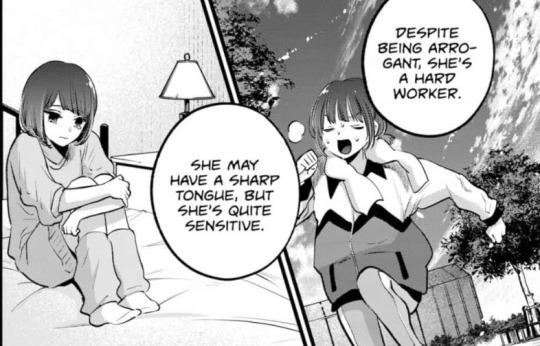
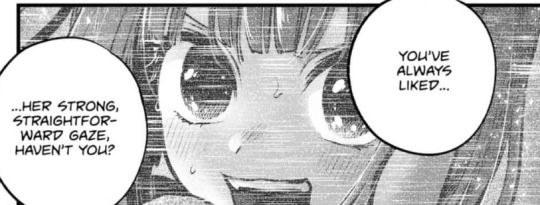
Compare that to this:
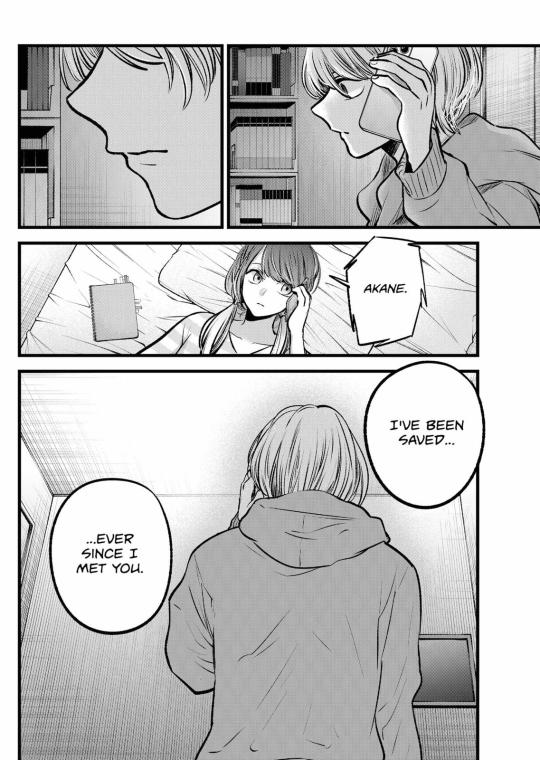
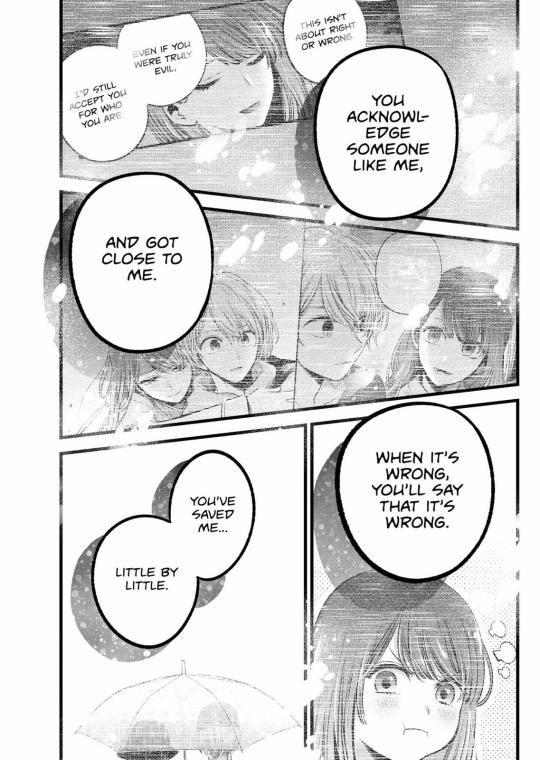
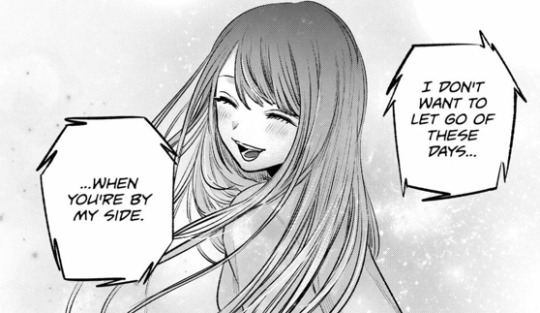
The writing in Aqua's and Akane's is so much better it's unreal 😂
I'm so glad to have confirmation that Goro's regrets were appeased by knowing that Sarina is living her best life as Ruby. Goro acting like an over-protective dad and Aqua reaffirming that Ruby is his precious little sister were the highlights of the chapter for me. Figures that once Aka finally gives us some Aqua insight, he immediately makes it clear where Aqua stands in regards to Ruby lmao
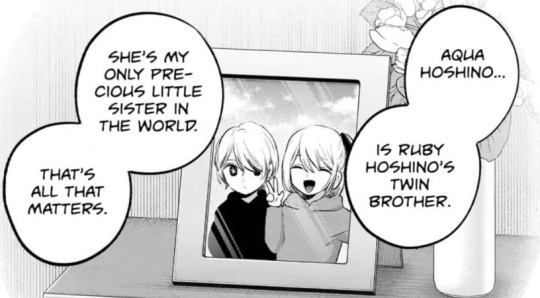
Goro is often personified as the guilt and regrets Aqua carried into this new life, but he is much more than that.

He is an entire framework of thoughts, complexes and experiences right there at the center of the individual we have come to know as Aqua. He is the entire base Aqua is built on, because when he reincarnated, he was just Goro - albeit a Goro thrown into a completely different situation, and a completely different life.
Of course, the longer Goro lives as Aqua, the more Aqua he becomes. He has been developing a new framework of thoughts, complexes and experiences that are more befitting of his situation and based on his current life. This all results in the Aqua we've come to known.
Up to now, Aqua has been simultaneously existing as the man he once was and the young boy he has become. But the man he once was is now feeling at peace knowing that Sarina-chan has gotten a new chance at life, which leaves the young boy he has become with one less reason to cling to a painful past.
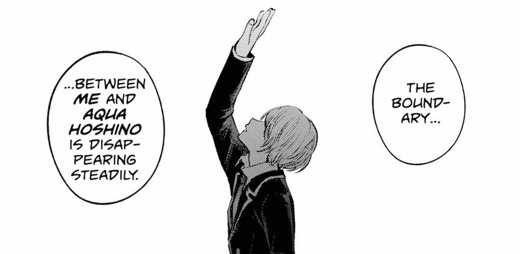
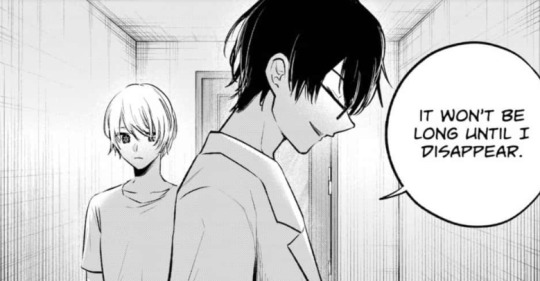
But things aren't that easy, as evidenced by the fact that even after being "freed" by his past guilt, Aqua still has his black stars. As Aqua, he has regrets, guilt and issues of his own to overcome.
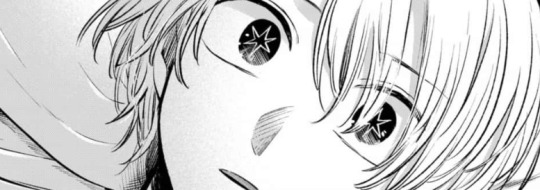
But it isn't just the revenge and the guilt, really. This, for example, is a confusion that has followed Aqua into his new life:
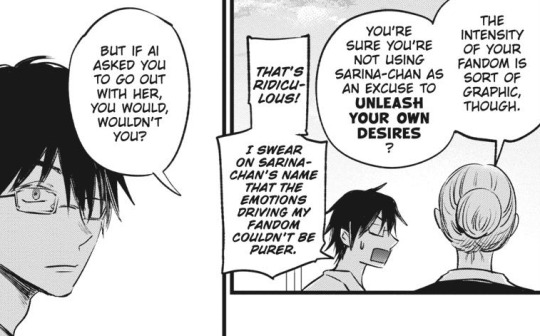
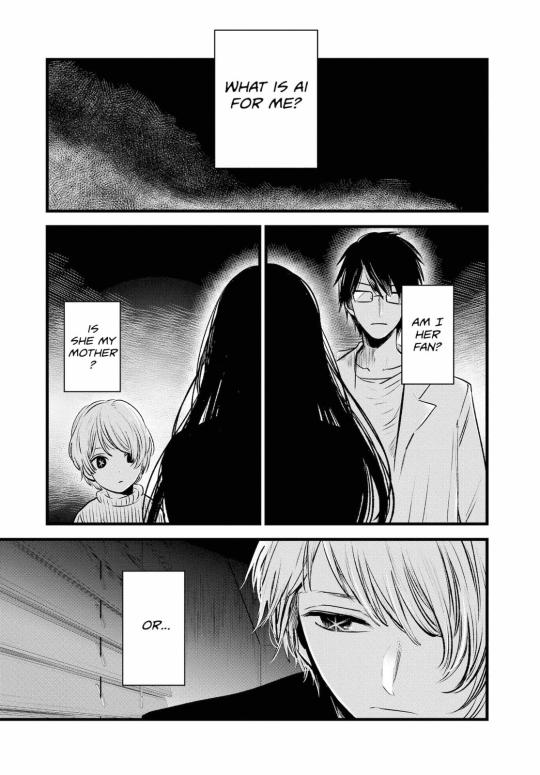
Which takes me to...
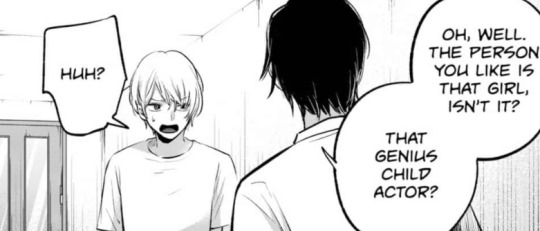
It's so incredibly ironic that it's "Goro" of all people who brings up Kana 😭 I've mentioned before that Kana has a lot of parallels with Ai and Sarina, and I theorized this may be one of the reasons why Aqua seemed so drawn to her from the get-go. And now we have Goro himself, the one who originally admired all of those traits, saying that Aqua likes Kana. It's like clockwork, except the clock may be broken.
The reasons Goro cites are so shallow and superficial, too. Perfectly fitting for an Oshi or a teenage crush, but hard to think of as anything deeper than that (for me, at least).
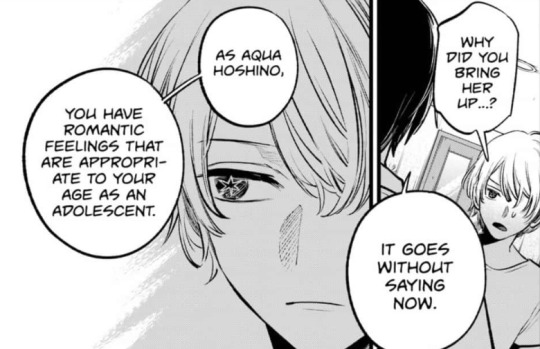
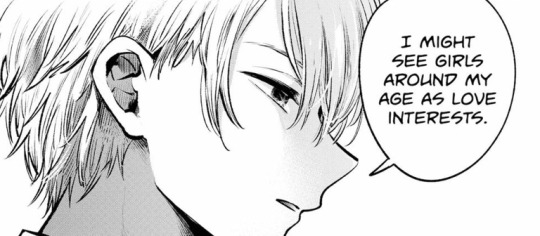
Which is even more ironic, because we end the chapter with Kana declaring herself as "seriously in love" with Aqua, when she herself does nothing but describe him superficially 😭
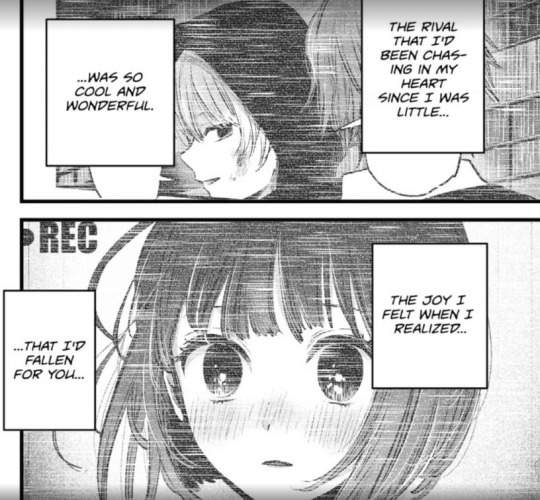
Kana has been basically living a shoujo manga in her head and Aqua is her chosen Male Lead 😂 It's like that time she thought Aqua was "straight and sincere", or when she thought Akane was a "goody-two-shoes".
Meanwhile, Aqua and Akane:
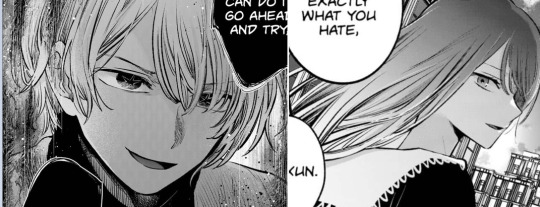
Poor Kana is out of her depth in this manga, but maybe that's the point. Kana is perfectly normal and that's just what Aqua needs am I right?
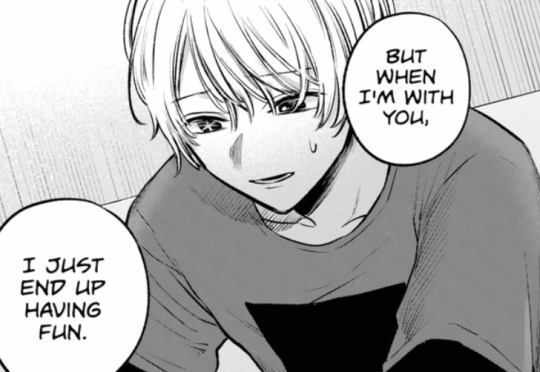
Seriously though, that's why I've always said that to me it doesn't really matter if Aqua and Kana end up together, because their writing is just... not it 😭 It's always just one giant trope without any depth of substance. It's no coincidence that these last three chapters are filled with tropes and forced writing. That's the way this ship has always been written in my eyes, and that's why it does nothing for me regardless of whether it's intended to be canon or not 😭
Even this, for example:
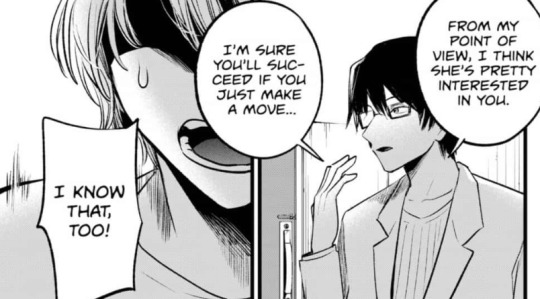
Aqua confirming (yet again) that he has been aware of Kana's romantic feelings all along could back-up what I said here and here. But at the same time, this could just be part of something as simple and unsubtle as this:
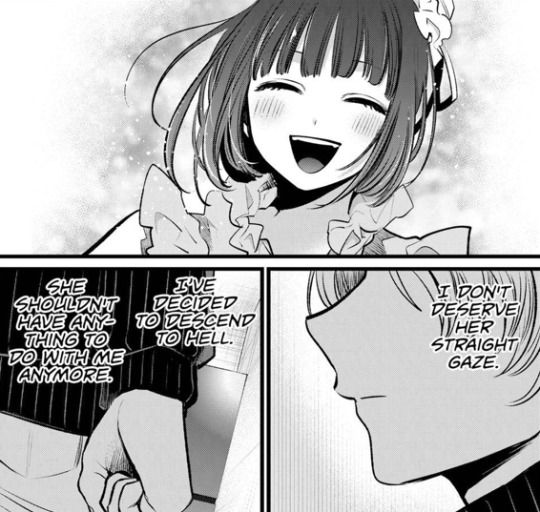
It's like there are two wolves within Aka. One is great at subtlety and organic development, and the other completely sucks at it 😂
But enough about that, I'm sure Aka will give me plenty to complain about next chapter so I'll save it until then lmao
Hmmm where have I seen this before?

Oh, right!
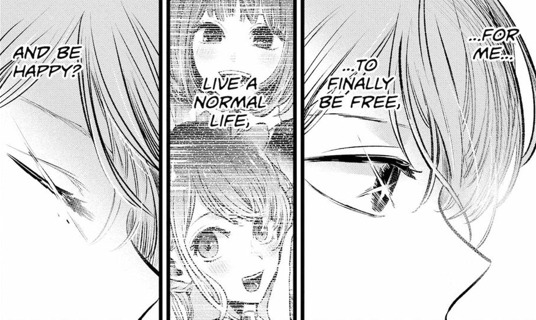
Funny how Akane is magically not brought up this chapter. If we assume Aka is just writing obvious stuff without deeper meaning, then Akane isn't brought up because Aka considers Chapters 97 & 98 as their romantic closure. Or maybe all the theories about Aqua being a scumbag that only dated Akane because Kana wasn't available were right. But considering that would make Aqua trash not worth discussing, I can only hope Aka won't stoop that low lmao
If we give Aka the benefit of the doubt (does he even deserve it at this point tho), then Goro not bringing up Akane can be pretty fitting. Because if Aqua likes Akane, it wouldn't be because she fits the ideals and tastes of the man he once was. It would be because of everything they have been through together as Aqua and Akane.

Case in point, when Aqua thought of Kana and Akane back when he first thought he was free, he did so as fully himself. But I digress! 🤡
Another thing that caught my eye is that Aka deliberately changed the number of chapters in the previous volume just so these Aqua-Kana focused chapters can be in the same volume as the Aqua-Ruby focused ones. Ruby, who mainly loves Aqua because he once was Goro and Kana, who just loves Aqua. Maybe he's doing it to contrast them (in favor of Kana, duh), or maybe he wants to show they're two sides of the same infatuation coin. One can dream, at least!
Speaking about not nice though, what the fuck is this 😭 I know Akane is trying to push Kana's buttons, but baby girl is switching from I-only-see-him-as-a-son!! I swear!!! to Haha actually! so swiftly that she's going to give herself whiplash. Plus, can't Aka let Akane push Kana's buttons while saying less OOC stuff? Granted, it's not like Kana knows Akane well, so of course she doesn't think it's weird for Akane to say that she wants to be with a boy on Christmas lmao
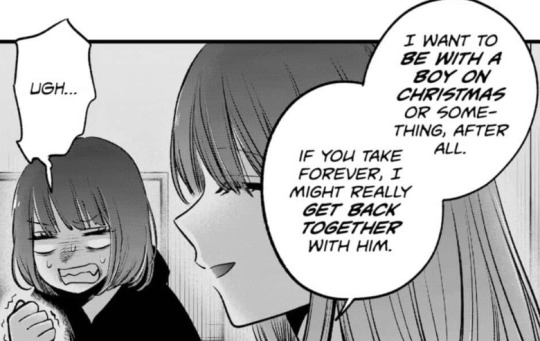
Poor Akane has gotten her eyes shut so tightly close that it's a wonder she doesn't walk into walls. She's really acting like a robot on auto-pilot 😂 When in the world will you be allowed to have a chapter of your own, Akane? When will we be able to look into your heart?
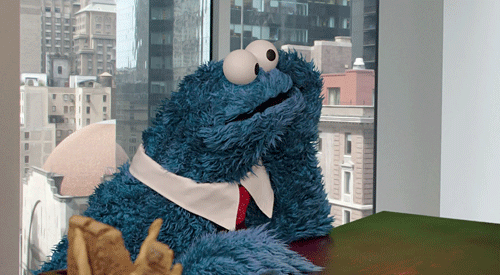
#my aquakane meta#except not quite again buuuuuuut old habits die hard#me: aqua and kana#I can foresee I'll be using that tag a lot even though when I started discussing OnK I said I'd rather talk about the ship I ship#rather than about the ship I find boring#alas Aka is forcing the content sooo discuss the content I shall lmao#fandom: onk#the next few chapters will either make or break aqua's character tbh#say a few prayers for the poor dude to make it
93 notes
·
View notes
Note
I know you're not super familiar with Fleetway, but I have the juciest idea for some angsty headcanons concerning Commander Brutus.
You know how he was made with copies of Robotnik's brainwaves to be just as ruthless as him and later tried to take over Mobius and all that? What if he went after Robotnik's spouse, too, and saw them as a necessary part of being ruler (though, also being genuinely infatuated by them because he has Robotnik's brain waves)? And Fleetway Robotnik has to save his poor, kidnapped spouse and put an end to Brutus.
How worried would Robotnik be for his spouse? Would his behaviour with them change post-kidnapping? That kind of stuff.
omgmgmgggg this is such a good concept. kudos to you for thinking of this 🙏🙏
I think that, given Brutus' intellect matching that of Robotnik, Brutus would wait for the perfect moment to take his spouse - likely at a point in time where a day or two would pass before Robotnik noticed anything was amiss.
I can only imagine the panic - at first, he's horrified that someone has taken and possibly harmed them just to get to him. But then the realisation comes that Brutus had come for them, and while he's still worried that they may be in harm's way, he becomes oddly... jealous - after all, Robotnik believes that he should be the only one, be it man or machine, showing his spouse such attention.
Then again, while Brutus has Robotnik's mental abilities and personality, I think there would be a certain dissonance between the two - Brutus is a robot, endowed with sentience or not, and he likely lacks the same social and physical nuance. Robotnik finds himself rather concerned at the idea of his spouse being harmed by accident - for he nor Brutus would ever intend to hurt them in any way, but Brutus is a robot. He was designed for combat and lacks full control of his own strength, after all.
I could almost see it as something like a King Kong situation, as silly as it is. Given Brutus' naivety towards his (or, rather, Robotnik's) infatuation with them, he has no idea what to do once he has them. All he knows is that he successfully obtained some random person that he has this innate attraction to, and for whatever reason, he has to keep them close at all times.
Not that the kidnapping thing would be a cakewalk for his spouse, though. Depending on how much time passes between when they're taken and when Robotnik finally pursues them, it could even be dangerous. I say this under the assumption that Robotnik's spouse is organic, and would therefore need food and water to survive - something that I don't foresee Brutus providing unless asked... and even then, he would likely put it on the back burner and first focus on his plans of world domination. In the face of such a realisation, I imagine his spouse to grow rather withdrawn - as convoluted as it is, Brutus is basically Robotnik in a different body. If their own survival comes second to taking over the world, then... well, it isn't exactly a comforting thought.
And I think that it wouldn't be any better when Robotnik finally shows up, only to speak of dethroning Brutus for his betrayal and interference with his own plans - without a single mention of his spouse. It feels like a betrayal in its own right - as if they're only collateral. So, the showdown happens in the same way, and when Brutus' framework of an empire falls apart and they're able to return, I don't think they would immediately come running back - which is also a shock to Robotnik. They had been taken from him! Were they not eager to be with him again?
But they do finally show up, given their reputation as Robotnik's spouse prevents them from going elsewhere. But they do not rush to reunite with Robotnik as he expected - no matter to him, though. Not in the moment, at least. For he has them in his arms once more, safe and sound, and is able to once again lavish them with all of the affection they so desire.
Except they don't seem to desire it. In fact, they seem to shrink away, an odd sadness in their eyes. At first, he thinks that perhaps Brutus had done something to them - but they deny such, and so he next thinks that perhaps they were upset that he had failed to protect them. But they don't seem upset about that either.
When he finally comes right out and asks why they've been so distant, the question finally comes: Does Robotnik value the wellbeing of his spouse over his pursuit of his own goals? It's an uncomfortable question for him, and his hesitance is very telling. He knows that it would be wrong to say that you don't come first - but... would it be a lie? He doesn't know.
He doesn't understand why it matters so much to them. He doesn't understand why he can't do both. And while his spouse appreciates his honesty... it certainly wasn't the response they were hoping for, either. They try their best to muster their usual sense of affection and love, and whilst it isn't completely absent, it... feels almost suffocating. It's an awful thought - that the man they married did not see them as paramount.
And it bothers Robotnik to no end that they still seem so cold and distant. He finds himself constantly agitated and distracted, always on edge and emotionally unstable - and after a week of such torment, he slowly begins to understand why the question mattered so much... as well as why his answer should have been clear from the very moment it was uttered out into the world.
And he immediately tells them all of this. Of his struggle without their usual support, of his frustrations and... regret, as odd as it is. For he now understands that he can't do both - in order to succeed in world domination, he has to have them by his side. For whatever reason, it drives him mad to be without them, and so he understands.
Not that he suddenly becomes perfect, or that he's immediately forgiven and things just revert back to how they were. So while it was a moment of great struggle, I find myself believing that it would strengthen his relationship with and appreciation for his spouse in the long run.
#angst with comfort thank god#if this scenario happened and WASN'T resolved??? goodbye i'd actually cry#i might've teared up while writing this actually#yeah i'm a cry baby 😞#dr robotnik#robotnik#dr ivo robotnik#ivo robotnik#fleetway robotnik#dr robotnik x reader#ivo robotnik x reader#fleetway robotnik x reader#writing#fanfiction requests
10 notes
·
View notes
Note
Hello lovely,
What are the pros and cons of pursuing a diagnosis?
I think I have autism (32 on the AQ, 139 on the CAT-Q, 157 on the RAADS-R, and 133 on the Aspie Quiz v5) but I'm a very high-masking gifted/honors/AP girl and I worry it will have more cons bc of poor societal acceptance then it will have pros : (
I mentioned my concerns to my primary care doctor and she really quickly dismissed them (I didn't mention the tests I did, just that I had a lot of traits/issues typical of autism) and I'm worried that trying to get help or anything will be a long hard uphill battle. Fortunately I am getting seen for sleep issues soon which are my worst problem but yeah
Thanks for your counsel
- 💙🌹
Hi there,
There are many pros and cons when it comes to getting an autism diagnosis. Here’s some from helpfulminds.co.uk
Advantages of Adult Autism Diagnosis:
1. Self-understanding and identity: Receiving an autism diagnosis as an adult can provide a profound sense of self-understanding. It validates personal experiences and challenges, helping individuals make sense of their differences. It offers a framework through which they can explore their unique strengths, interests, and areas of difficulty, leading to greater self-acceptance and personal growth.
2. Access to appropriate support and accommodations: An adult autism diagnosis opens doors to various resources and support services. It enables individuals to access specialised therapies, counselling, and tailored interventions. It may also qualify them for workplace accommodations, such as flexible schedules, task modifications, or a supportive work environment. These support systems can enhance well-being, foster independence, and improve overall quality of life.
3. Connection and community: Obtaining an autism diagnosis can provide a pathway to connecting with others who share similar experiences. Joining support groups, online communities or participating in autism advocacy networks can foster a sense of belonging and reduce feelings of isolation. These connections often offer invaluable emotional support, shared experiences, and practical advice.
4. Enhanced relationships and communication: Understanding one’s autistic traits can lead to improved personal and professional relationships. It helps individuals communicate their needs and preferences effectively, reducing misunderstandings and promoting better understanding among friends, family members, and colleagues. With increased self-awareness, individuals can build stronger connections and cultivate healthier interactions.
Disadvantages of Adult Autism Diagnosis:
1. Emotional impact: Receiving an autism diagnosis as an adult can trigger a range of emotions, including relief, validation, but also grief or regret. Some individuals may experience a sense of loss for the opportunities they feel they missed or the difficulties they faced due to a lack of understanding. The process can be emotionally challenging and require support to navigate.
2. Stigma and societal perceptions: Unfortunately, despite growing awareness, Autism is still surrounded by stigma and misconceptions. Disclosure of an adult autism diagnosis can lead to potential discrimination, prejudice, or social exclusion. Society’s limited understanding of Autism may hinder employment, education, or social integration opportunities. This lack of acceptance emphasises the need for broader awareness and education.
3. Limited diagnostic resources and accessibility: Obtaining an autism diagnosis as an adult can be challenging due to limited diagnostic resources and professionals specialising in adult assessments. Waiting times and financial constraints may present significant barriers for those seeking a diagnosis. This lack of accessibility may lead to delayed self-understanding and hinder access to vital support services.
Seeking an autism diagnosis as an adult has advantages and disadvantages. While the diagnosis can offer self-understanding, access to support, and a sense of community, it may also evoke complex emotions and expose individuals to societal stigma. It is important to weigh these factors and consider personal circumstances before pursuing a diagnosis. Regardless of whether one receives an official diagnosis, fostering acceptance and embracing neurodiversity can contribute to a more inclusive and understanding society.
The full article will be below. There are even more pros and cons, so those are just examples. I recommend researching for more to make up your mind.
I hope this helps. Thank you for the inbox. I hope you have a wonderful day/night. ♥️
50 notes
·
View notes
Note
May I ask, what’s job is Chester in your AU?
I couldn’t tell what job he is. If it’s already mentioned then I might had missed that during looking through all your posts.
I’m guessing is Timmy a lawyer? I mean I can see by looking at his outfit. I like how it’s all black, no pink tie.
Almost as if he doesn’t like pink, right?
If so, poor Wanda, but I’m sure she would understand why he doesn’t like pink, right? I mean he was forced into wearing pink by his parents, especially with that pink hat, isn’t that what happened? That something his parents wanted a daughter, of course. 🤦🏻♀️
saw some non- FOP art posts, those got me wondering….are you Christian?
I’m Christian myself, so yeah. I wasn’t sure if I’m supposed to ask, but that face, I recognized him. Even though I like those art you did.
My apologies if not.
Take care!
Good morning, I have finished my vacation and now I can finally use my PC to reply to your message! XD First of all, thank you for reading my post. I'm glad my Chester has caught your interest. 🥰
The content outline is:
1. Adult Chester 2. Adult Timmy 3. Adult Timmy and pink 4. Belief
This post might be a bit long but here we go! ↓
About adult Chester, he is a free-spirited musician. Sometimes he is a street performer, sometimes he is a resident singer, and sometimes he plays with children. (He may also have a Youtube channel) That's why I drew him and Jasmine together.
( But if you're asking about ANW's adult AU, I haven't thought about it yet. )
-
Personally I hope Timmy is Dale's employee (I hope both Dale and him can remember the glass of lemonade) and Timmy in this AU is Dale's… boot secretary (but it's just a very arbitrary title, we all know that the actual job content is not just boots)
But if the above conditions are excluded, Timmy would be an ordinary office worker, perhaps a salesperson. I hope he lives an ordinary and happy life.😌 I don't know if they are old enough to have kids at this point in ANW so I haven't thought about the family part yet.
-
About pink, It's not that he no longer likes pink, it's just that he's wearing the company-mandated uniform. (He was too lazy to go shopping for clothes so he let the company handle everything for him)
He gave his pink hat to his fairy family (but he forgot about it and thought it might have been lost in the corner of the closet) This is one of the reasons why, in another series, Dale can't remember him. Of course, Timmy's everyday clothes still have plenty of pink! He made it his symbol! Long ago pink was considered as one of the symbols of femininity but I believe he understood early on that this framework was meaningless. (Of course I'm sure he likes green and purple too!!)
-
Regarding my beliefs, no, I am not a Christian! Taiwanese people believe in Buddhism, Taoism and local customs (I'm not sure if I can express it well, there are many fusion parts here, it's a bit difficult for me to explain) But actually my faith is not as strong as that of Christians, and I don't go to temple often....
My knowledge of Christianity is limited to some historical documents and biographical stories about Jesus (so I can't discuss the in-depth content of the Bible with any Christians)
I actually like Luce. Luce lit up my soul when I was feeling very depressed. Then through Luce, I started to be interested in Jesus. During that period, I also watched Moral Orel.
(My idea is very simple, I just regard them as God's children, and modern society is much more peaceful than before, I hope they can enjoy it, so I drew them traveling together)
I was actually a little nervous when I was drawing Jesus because I wasn't sure if Christians would be offended by my art, and I didn't want to undermine your faith.🙏
If you find anything weird, tell me! I might just be a weird little fan artist in the eyes of some more cautious people 🤣
4 notes
·
View notes
Text
Some observations about Buck coming out fic
so, I've thinking about the over 200 fics I've read in the past three weeks. so many of them have been wonderful and amazing and satisfied my poor obsessive heart, 9-1-1 is like, top 3 in my bookmarks rn. and the thing i love the most about all of them is how many different ways people have envisioned Buck coming out to the rest of his family.
cause all we have now for reference are Maddie and Eddie, right? one played a bit more humorful with jokes and quippy dialogue, and then one very serious (albeit, a bit rushed) coming out moment that clearly gives Buck some peace of mind. this is the only canon stuff we have to go off of.
so, we still don't know anything about how he'll come out to everyone else. with the Madney wedding and the seemingly three-week time skip (?), there's a lot of space to brainstorm about the circumstances and what he says to them, and how people react. it's like we're in a weird limbo of post-7x05, pre-7x06 where everyone is just taking the breadcrumbs of what we have and running with it. it's super fun to watch.
some of my favorite tropes that keep popping up: the classic pre-7x05 "Buck freaks out after the kiss and runs to Hen's house", the "telling everyone all at once at the firehouse", the "waiting until it's revealed kind of unintentionally at the wedding after nondescript chaos had occurred", or "someone clocks it when Tommy comes in to visit one day". Hen's reaction being like "omg welcome to the club" or possibly "you kissed WHO?!", Bobby being unsurprised and having a real Dad Moment™, Chim having a bit of a "wait wtf" or even getting more hung up Tommy is dating Buck, Athena giving Tommy the "you hurt him, i'll shoot you" talk, Josh LOSING it when he finds out Maddie's brother is dating a guy, everyone initially assuming the guy he kissed was Eddie.
it's such an interesting time because we have this framework from the end of the episode, and everyone is just playing around with different ways the conversations could happen. I think i've read like, eight different versions of Bobby being completely unphased by this revelation and i've loved all of them.
it's also probably a product of the fact that in actuality, 7x06 will be 70% Madney wedding drama; scenes with Chim being kidnapped (? or whatever), all hands on deck to find him, probably some karaoke flashbacks, hopefully a Tommy helicopter rescue scene, then the actual wedding happening at Bobby and Athena's house or something. so not much time for 5 minute long coming out scenes--i'm envisioning maybe stray comments in the whole 24 hours earlier they'll likely do leading up to Buck and Eddie waking up drunk, possibly have him sheepishly mention that his date to the wedding is Tommy. i think the worst thing they could do is have Buck telling everyone be off-camera.
so yeah, those are just some of my thoughts. my personal favorite version is Buck being like, "I'll tell everyone before the wedding!" so as to not make it a thing, Chim knowing he has a plus 1 and harassing him about who it is, Buck never getting around to it because he's still sort of awkward about the whole thing, then when Tommy airlifts Chim to his damn wedding, Buck just runs up and kisses him, and the whole 118 is like ???? it likely won't happen, but I adore that concept.
curious if others have some predictions for the actual coming out moments with the rest of the 118, or some of their favorite tropes that have arisen on ao3 over the past few weeks.
#911 abc#911 show#911#evan buck buckely#evan buckley#911 eddie diaz#911 fanfic#911 fic#ao3 fanfic#fanfic
7 notes
·
View notes
Note
When thinking of your trademark in your writing, I think it is the way you go into details and paint a picture for the mind's eye. The way you balance descriptive imaginations and realistic detailing is just very captivating.
Your art has a funky loose feel to the lining that just feels fitting to the enigma that is your brain, too full to truly poor it all out onto the paper no matter how hard you try. But boi do we love the attempts that give us any slightest peek into that brilliant mind of yours.
You clearly don't draw or write without thinking it over thoroughly.
Bwaaaaaaaa

Thank u! that's super sweet of you to say.
I do tend to overthink a lot of things.
I'm not very good at making like... Outlines or roughs of poses. I very rarely make base outlines, like I usually just start drawing and the rough sketch becomes the final lineart. So I often rely super heavily on references when I draw. For some reason over my 28 plus years of drawing, I never really gotten a grasp on how the torso, legs and fingers all really connect and form one entity. I know I could try with enough discipline and practice, as art is a skill. So I have this weird blend of like... Super confident lines, but not knowing how a torso, shoulders and legs connect which make a really interesting balance, and leads to things like this:
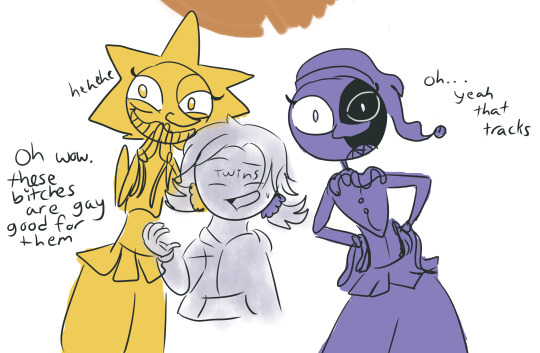


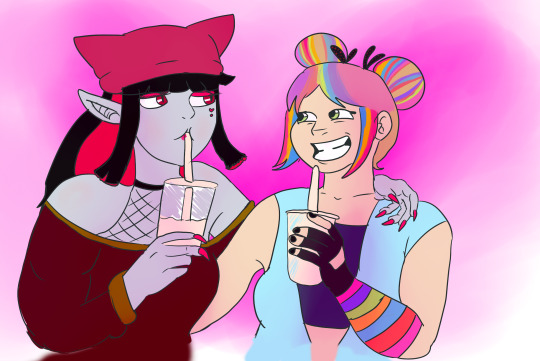

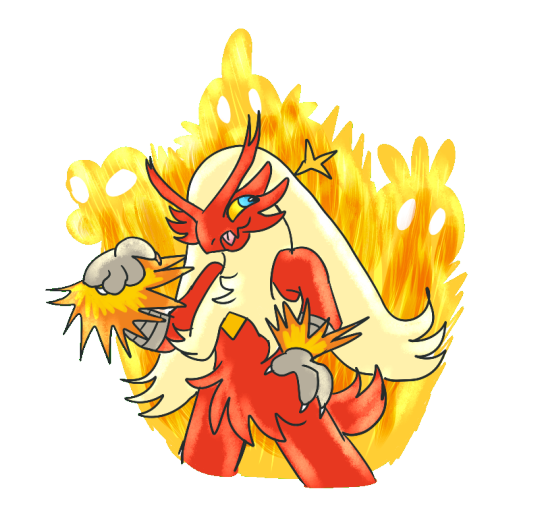

Like I can always see the framework of what I want, especially when little reference is used, but it really seems like nothing connects. Like the understanding of SHAPES is there, but not the understanding of how they are coherent together, if that makes sense? And you can kinda see that in my more high profile art, but I feel there was a period where It did click and I understood how it all connected but I forgot it all.
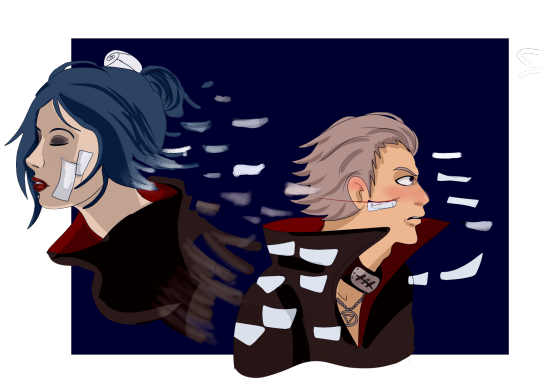

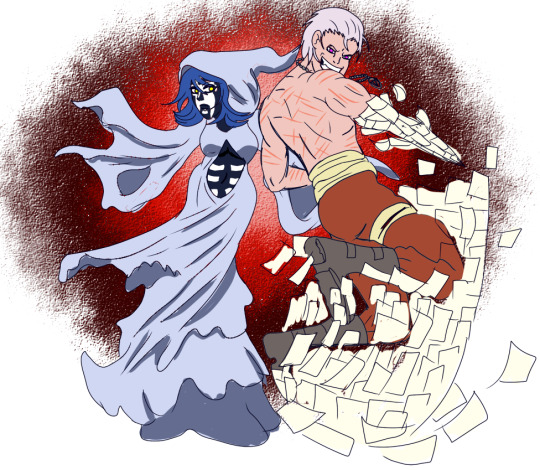
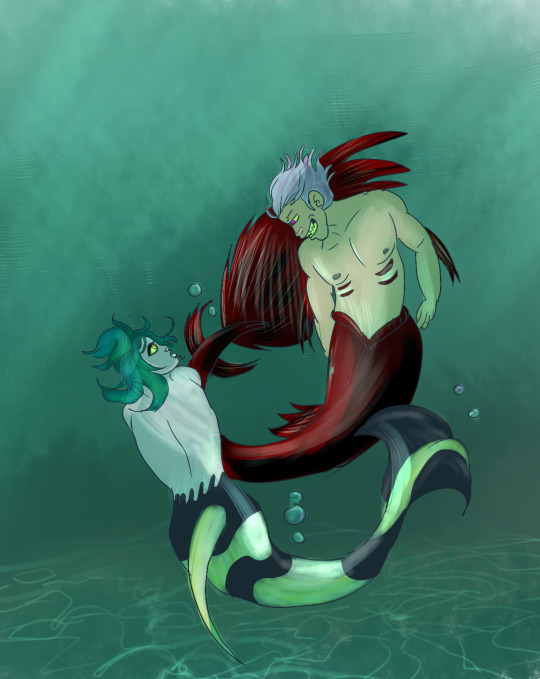

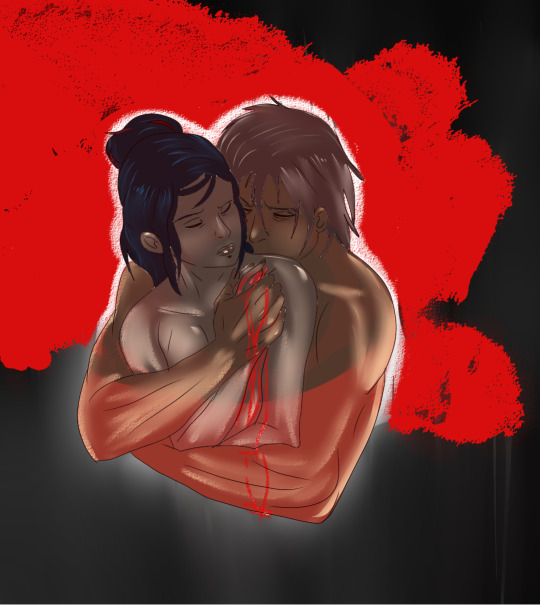
Like at some point, with these two, (rest in peace. the ship tag has not been updated since I left the naruto fandom) around 2019 I was getting it! Like I felt I was really getting it, Like I MADE THESE!!!! but then I kinda forgot it all. Like I still didn't use a base outline for these and did rely on heavy references, but I feel I was getting a grasp on shading and autonomy and how the human body works and fits together. And then it... Just kinda vanished from my brain, and I regressed to a more chibi simple art style. Either because it was easier, or because I was experiencing more chronic pain in my back and hand.
At the end of the day, I think my art style regressed a lot due to lack of practice, and lack of encouragement from outside sources besides the internet likes and reblogs like RL friends or Family. That, and I feel my attention span and patience for things has just gotten worse as I've gotten older. I'm guessing my Dad's death had a lot to do with that. As, I am over the loss of my Dad as a person. but mentally, I am not over coming the fact that mortality is very fleeting. You think I would spend most of my time living life to the fullest. But that isn't the case. I kinda feel like I've been stuck in that "What is the point of anything if anyone can die suddenly without warning for any reason" Stage of grief that I have NEVER really got over.
Needless to say my Dad suddenly dying with no warning due to a ruptured aurora was just something everyone was unprepared for. He wasn't sick from an illness, no one knew he was in poor health. It wasn't even a car accident. Like he just suddenly died cus part of his heart exploded essentially.
I mean, I know I rarely talk about it, other then mentioning "My Dad died Eight years ago. Haha I'm over it tho, it was awhile ago"
And, While I think I'm over it in the sense with, I'm at peace with always missing him a little bit, and don't think about him constantly... I'm not over it in the sense of how fragile mortality is and how it can be taken away. For no just cause or reason.
I guess I'm over it, in that I'm over that my Dad, the person is dead. I am NOT over the fact of HOW he died. And I think it'll be a long time till I cross that hurtle.
And yeah, that's a heavy part of life, that we all get old and die one day, but some people don't even get to grow old. you think it would make me more.... "make time with what you have, enjoy what you like."
but if anything, it makes me more fearful in "what is the point of doing anything if I were to die tomorrow, what have I done. Folks will miss me, sure. But I will still be gone." So then I just end up doing nothing for long periods of time, and that's mostly why my art skills suffer because I don't see the point of doing a discipline or working towards any goal whatsoever. And I'm just going through the motions. And yeah, sometimes, I will be super productive and be happy and do a lot of things for a bit, but they're always short lived moments and it's hard to stick to things.
Looool sorry if that's all just too heavy.
Oh, if this sounds too complaining... Or "pity party. Woe is me, Dana is Depressed again" ahahahah. Like, that's not the point of this. I mean, it's my blog and I can talk about my feelings I guess, and I feel that Depression, even before my Dad's death impacted my art journey. So I'm still trying to struggle to remain consistent in my endeavors.
Or I could just be lazy. XD That too. XD
Anyways... Moving on in terms of my writing style, that's very nice of you to say.
I am a deep appreciator of inner monologues if it wasn't obvious. I like to dissect what characters are thinking and I sometimes feel I overdo it, and justify every single action and breath they take by getting so close in their own head that there's hardly any breathing room for error.
But I just write how I tend to think in terms of Overthinking, so I don't think I've ever written a character from a close third person (or first person) perspective that hasn't overthought every action before they speak.
But usually within the context of the story, their inner monologue spanning 20 pages actually takes place in the span of less then a few seconds.
I don't think I could write from Bob's POV if I tried. He's a man of action rather then overthinking. And if I held his hand as a third person narrator, he would sho me off and do his own thing gladly without my interference. XD
Anyways. Didn't mean to get so venty on this ask.
Thank you so much for the lovely compliment. Also some insight into my process I guess. XD
2 notes
·
View notes
Text
Hi! I work in social science research, and wanted to offer a little bit of nuance into the notes of this post. A lot of people seem to be referring to LLMs like ChatGPT/Claude/Deepseek as purely ‘generative AI’ and used to ‘fix’ problems that don’t actually exist and while that is 99% true (hell in my field we’re extremely critical of the use of generative AI in the general public and how it is used), immediately demonizing LLMs as useless overlooks how great of a research tool it is for fields outside of STEM.
Tl;dr for below the cut: even ‘generative AI’ like ChatGPT can be used as an analytical tool in research. In fact, that’s one of the things it’s actually built for.
In social sciences and humanities we deal with a lot of rich qualitative data. It’s great! We capture some really specific and complex phenomena! But there is a drawback to this: it’s bloody hard to get through large amounts of this data.
Imagine you had just spent 12 months studying a particular group or community in the workplace, and as part of that you interviewed different members to gain better insight into the activities/behaviours/norms etc. By the end of this fieldwork stint you have over 20 hours worth of interviews, which transcribed is a metric fuckton of written data (and that’s not even mentioning the field notes or observational data you may have accrued)
The traditional way of handling this was to spend hours and hours and days and days pouring over the data with human eyes, develop a coding scheme, apply codes to sections by hand using programs like Atlas.ti or Nvivo (think Advanced Digital Highlighters), and then generate a new (or validate an existing) theory about People In The Place. This process of ‘coding’ takes a really long fucking time, and a lot of researchers if they have the money outsource it to poor grad students and research assistants to do it for them.
We developed computational methods to handle this somewhat (using natural language processing libraries like NLTK) but these analyse the data on a word-to-word level, which creates limitations in what kind of coding you can apply, and how it can be applied reliably (if at all). NLP like NLTK could recognize a word as a verb, adjective, or nouns, and even identify how ‘related’ words could be to one another (e.g ‘tree’ is more closely related to ‘park’ than it is to ‘concrete’). They couldn’t keep track of a broader context, however. They’re good for telling you whether something is positive or negative in tone (in what we call sentiment analysis) but bad for bad for telling you a phrase might be important when you relate it back to the place or person or circumstance.
LLMs completely change the game in that regard. They’re literally the next step of these Natural Language Processing programs we’ve been using for years, but are much much better at the context level. You can use it to contextualise not just a word, but a whole sentence or phrase against a specific background. This is really helpful when you’re doing what we call deductive coding - when you have a list of codes that relate to a rule or framework or definition that you’re applying to the data. Advanced LLMs like ChatGPT analysis mode can produce a level of reliability that matches human reliability for deductive coding, especially when given adequate context and examples.
But the even crazier thing? It can do inductive coding. Inductive coding is where the codes emerge from the data itself, not from an existing theory or framework. Now this definitely comes with limitations - it’s still the job of the researcher to pull these codes into a coherent and applicable finding, and of course the codes themselves are limited by the biases within the model (so not great for anything that deals with ‘sensitive issues’ or intersectionality).
Some fields like those in metacognition have stacks of historical data from things like protocol studies (people think aloud while doing a task) that were conducted to test individual theories and frameworks, but have never been revisited because the sheer amount of time it would take to hand code them makes the task economically and physically impossible. But now? Researchers are already doing in minutes which historically took them months or years, and the insights they’re gaining are applicable to broader and broader contexts.
People are still doing the necessary work of synthesizing the info that LLMs provide, but now (written) qual data is much more accessibly handled in large amounts - something that qualitative researchers have been trying to achieve for decades.
Midjourney and other generative image programs can still get fucked though.
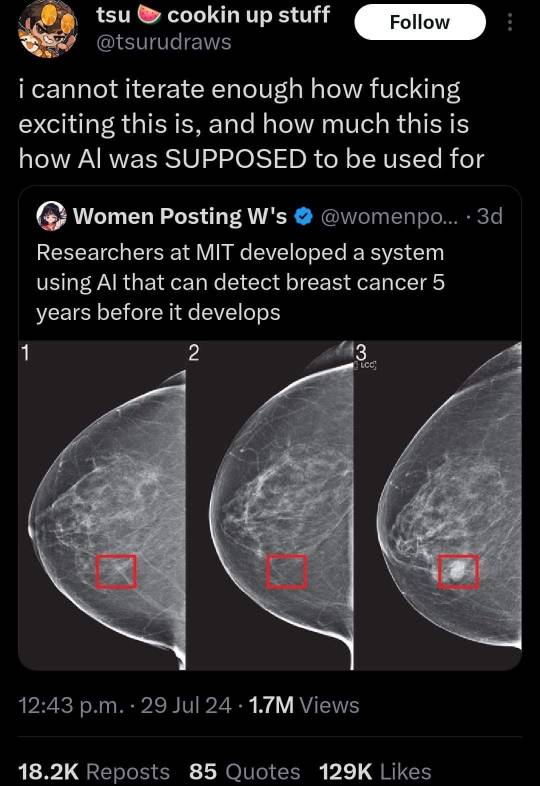
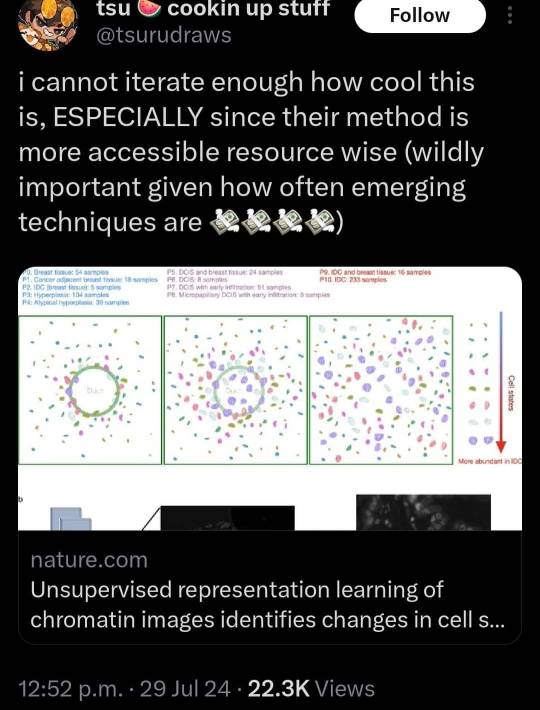

#sorry I don’t normally add to posts and definitely never this much#but I want to offer a slightly different perspective#TO BE CLEAR I HATE HOW CHATGPT IS BEING USED IN THE BROADER WORK SOCIETY#BUT#please please please remember that qual research exists and LLMs like ChatGPT emerged out of the need to analyse this qual data
179K notes
·
View notes
Text
Backside Friends
Oh right, I Will be There (1997) is also still around.
I'm genuinely sorry that I have withdrawn my attention from this song all this time, because you have to know, if I had a consistent Paul Stanley top-whatever list of my favorite Kiss kompositions, this song would be included without any question. And I can hardly say anything else about Bruce's absolutely outstanding solo (1).
So, whenever this gorgeous song is mentioned in fan circles, wherever they happen, it is always and above all briefly pointed out that this is just the Kiss version of a classic acoustic Led Zeppelin ballad. It goes without saying that any reference to which Led Zeppelin song exactly it might be is just as persistently omitted.
If we can even speak of a single song at all, if not three, whereas one of those may be a Humble Pie song anyway. Just to help out a little. But while I'm at it, I might as well carry on, because Humble Pie's Take Me Back's (1969) intimate ambience thus sets the framework, to a certain extent, not only for I Will Be There's solo, but also for its overall conceptualization (2).
Which of course could also apply to Led Zep's Black Mountain Side (1969), only in a slightly moodier, in the best sense of the word, quirkier way. And because Kiss would never get away with the oddball playfulness of a Zeppelin instrumental (3), they've more or less remodeled it into a more dignified songwriting format that suits them and just kinda absorbed it into it, instead of leaving too much internal space to the pure playfulness.
It's hard to express without having direct melodic or structural references in mind, but when I listened to Black Mountain Side in a Kiss context for the first time in over 30 years, I immediately and irrevocably realized what Paul song must have been the inspiration for.
And then we still have Friends (1970), which demonstrates how digestible strings are over an acoustically grooving band, albeit with an oriental note and an ecstasy that is far removed from I Will Be There. But even on Friends, it's more the basic arrangement of the instrumentarium of acoustic guitars than anything else, reminiscent of I Will Be There without any direct structural connection. Just let Friends play to the end and then I Will Be There immediately afterwards. I think you should then immediately realize what I have in mind and try to explain in vain.
Thus we already have our three acoustic songs for today, all of which, to my nose, would provide the framework for the sound character of this in-depth and heart-warming exceptional Kiss ballad. Whether anyone should have any doubts about it is immaterial to me, because when I look at Kiss' previous hit list, I know exactly what ground I'm standing on.
Let's see what else can be shaken out of the rest when time is right.
Side Notes:
(1) Although I would like to go into this in more detail elsewhere than here and now. Check out one of the upcoming Bruce's Solos features.
(2) Although it is just as reminiscent of Metallica's opener for Ride the Lightning (1984), Fight Fire With Fire and its acoustic intro.
(3) Sometimes it makes my heart ache just to recall all the complaints about the bongos from the united Kissians worldwide. Those poor things.
I Will Be There (1997)
youtube
Take Me Back (1969)
youtube
Black Mountain Side (1969)
youtube
Friends (1970)
youtube
#Kiss#Paul Stanley#Curtis Cuomo#Bruce Kulick#I Will Be There#Carnival Of Souls#Head#Toby Wright#Led Zeppelin#Jimmy Page#Robert Plant#Friends#Led Zeppelin III#Black Mountain Side#Humble Pie#Peter Frampton#Take Me Back#Town and Country#Andy Johns#1969#1970#1997#Roland Rockover#Youtube
1 note
·
View note
Note
Andy Merrill who co created Coast to Coast and the Brak Show (and voiced Brak) said in a DVD commentary that the Brak Show doesn't retcon anything from the original series and Brak and Zorak actually met in prison where they were cellmates, and likewise the Brak Show still happens after Cartoon Planet and a special called "Brak Prensets the Brak Show Starting Brak". Also Brak wouldn't be stupid if they really went back in time because Brak had a personality altering brain injury before C2C
I think that's a fair guess for a timeline but I think it's probably more related to the release order (cartoon planet came before the not-pilot for the brak show, the brak show being the most recent, and many episodes making jokes about original brak's death/serious injury being the cause of his personality change). I like Merrill's work and have looked into some of the stuff he's said online I just personally think it's probably kinda futile to try to put a stiff timeline on c2c & cartoon planet & the brak show aside from their own internal logic due to them having somewhat loose plots to begin with; this sounds like more of a suggestion than a solid framework because the stories themselves aren't clearly coherent bc of the surreal comedy elements. (Ie, in some episodes of c2c it certainly looks like they died when the credits roll and the incident is simply not mentioned again)....so I guess I just kind of view the timeline past the actual superhero plots as pretty irrelevant.
also as a sidenote I think the joke about brak changing his entire personality due to a brain injury is in poor taste and I'm not a fan even if I don't think it's like "ohhhh let's cancel them they're terrible people now it's an evil show" I just don't like it so I ignore it. "what's your explanation then" doesn't need one. he talks and acts like that cuz it's funny, the reasoning for that change doesn't matter. (there's also a couple jokes in c2c & Brak show that could be interpreted as transphobic or homophobic but I. Also ignore those. Partially because it's 20+ years old now, partially because they aren't a big enough part of the show for me to really bother with them.) also not mad at you anon or implying anything you didn't come up with that nugget of lore I just am literally saying I don't like it
1 note
·
View note
Text
I saw a post recently to the effect of “If you’re going to do the reincarnated wife plot in Dracula, it would at least make more sense if Dracula’s reincarnated love was Renfield”, and I think that’s a very intriguing thought, but I’d like to suggest an alternative idea that’s taken over my brain lately: Renfield as Van Helsing’s offscreen “mad wife”, who we briefly hear mentioned in the book but never see or learn any details about.
Let me just lay out my case here:
Van Helsing has a wife who, we’re told, is mentally ill and presumably in an asylum. Her mental breakdown is often assumed to have had something to do with Dracula, even though there’s nothing in the text that explicitly suggests this.
Renfield is a man around Van Helsing’s age (presumably - Renfield is explicitly 59, and Van Helsing seems to be middle-aged) who’s mentally ill and in an asylum. His mental illness is often assumed to have been caused by Dracula, although there’s nothing in the text that explicitly suggests this.
We never see Van Helsing’s wife onscreen, nor do we learn any details about her as a person, her relationship with Van Helsing, or the events that led her to where she is at the time of the book. It’s often theorized to be in some way connected with the death of Van Helsing’s son (also briefly mentioned but not elaborated on), which I think makes sense, but again, we know no details. Did she have a breakdown from the grief of losing her son, or did the same thing that killed Van Helsing Jr drive her out of her mind? Or is it a bit of both?
Van Helsing obviously couldn’t go around referring to a “husband” or male lover in the Victorian era, so it makes total sense that (when he can get away with it) he’d refer to having lost a “wife” to make people understand the kind of grief he’s talking about without giving himself away.
Now, to be clear, I absolutely don’t think this is canon, nor does it work seamlessly as an interpretation of canon. There are a number of nuances in canon that point against it - let’s start by looking at Van Helsing’s full statement about his wife:
“... and me, with my poor wife dead to me, but alive by Church’s law, though no wits, all gone—even I, who am faithful husband to this now-no-wife...”
“By Church’s law” means that the Church still considers them married despite Mrs. Van Helsing’s condition, which obviously makes no sense for a relationship between two men that the Church wouldn’t have recognized in the first place. And that would be a very random thing for Van Helsing to throw in there if it wasn’t true.
Also, this is a very delicate topic (and the whole thing touches uncomfortably close to ableism, obviously), but... the way Van Helsing talks about his wife here - “dead to me, though alive by Church’s law”, “no wits, all gone” - makes me picture someone who isn’t as lucid and aware as Renfield seems to be. Like maybe someone who’s in a catatonic state, or who’s so completely lost her sense of reality that she wouldn’t even recognize Van Helsing or be able to interact with him in anything approaching a normal way anymore.
So no, I don’t think it 100% works within canon - but what’s striking to me is how seamlessly it fits into the canon framework if an adaptation or AU fic chose to go this route, while also bringing a ton of new dramatic and emotional potential to the table.
And I can see them making sense as a couple, is the thing. They’re both very intelligent, creative, and intellectually curious (and, perhaps, a bit high-handed at times). Jack writes that Van Helsing has “an absolutely open mind” and “his views are as wide as his all-embracing sympathy” - despite being a scientist whose work is rooted in facts and logic, he’s willing to consider ideas that others might consider absolutely crazy, like the existence of vampires. And the same, of course, is true of Renfield as well. He’s not just a crazy person with random crazy delusions - there’s a clear logic behind the ideas he’s pursuing, and one that isn’t even entirely bizarre when we consider that he exists in a world where vampirism is real.
The way Renfield systematically sets up investigating his theories, moving from one carefully planned stage to another and recording the results in his notebook at each phase, is like a twisted science experiment (again, something Jack specifically notes about him). And I wonder if there isn’t a clue to his past life there: Maybe once upon a time he was doing actual science experiments - unconventional ones, to be sure, maybe pursuing ideas that other people would dismiss as ridiculous, but not anything twisted or harmful. And I can imagine Van Helsing being absolutely fascinated by the work he was doing - that both of them, in fact, would have valued having someone they could always brainstorm with and discuss any idea, without the limitations that narrower minds might place on them.
I’m also kind of obsessed with the dramatic potential of the fact that the first time they interact face-to-face in the book is the scene where Renfield is begging to be let out of the asylum. Like imagine if up to that point, everything’s played out exactly the way it does in the novel - you have the scene of Van Helsing talking about his “wife” (maybe even in a bit more detail, in a scene where he’s trying to comfort Jack or something?), and you have Renfield having his whole plot unfold, and there’s absolutely no hint that there’s any connection between the two. And then suddenly you have that scene, and from the second Van Helsing walks into the room you see that immediate moment of recognition between him and Renfield.
And Jack is oblivious to this, going through the rounds of introducing everybody, and meanwhile Van Helsing and Renfield are just staring at each other in absolute silence. Like cannot take their eyes off each other, the rest of the gang might as well not even be there.
Until, before Jack can get up to Van Helsing’s introduction, Renfield very calmly and clearly says “Hello, Abraham.”
And like, how does that change Van Helsing’s reaction when Renfield starts pleading??? Would he beg Jack to go along with it? Or would he just be standing there frozen, not trusting himself to speak in case his feelings are clouding his ability to think clearly?? How much of an emotional punch does it add to the scene if Renfield can turn to him and say “You used to trust me before; why won’t you trust me now??”
Bear in mind, even in canon Van Helsing admits if it had been up to him, he would have been about to let Renfield go (at least, up until “that last hysterical outburst”). How much more might that be the case if he has an emotional connection to this man on top of everything else?
I think, if it was up to me, I wouldn’t directly tie Dracula into their backstory - that feels too pat and simplistic IMO. But I think I’d have it that their son was preyed on and eventually killed by a vampire, and they didn’t realize what was happening in time to save him. Afterwards, their attempts to piece together what had happened account for both the fact that Van Helsing clearly has some pre-existing knowledge of vampires (but is clearly not the expert vampire hunter pop culture often portrays him as), and also the cause of Renfield’s current obsession. I can imagine the grief and trauma of having lost his son, along with the unreality of starting to understand that something totally outside of the normal world did it, taking a toll on his probably already-not-great mental health until his attempts to solve what happened spiral into a full-on breakdown and end up with the obsession with vampirism we see in the novel.
(How do they have a son as a gay couple in the Victorian era, you ask? I honestly don’t think it’s that hard to justify. You can either say Van Helsing did previously have a wife and was widowed, or that it’s an orphaned kid one of them took in as a ward and considered their son (similar to Jonathan’s situation with Mr. Hawkins, perhaps?)).
I don’t think it was bad, at all, for the novel to leave some things up to the reader’s imagination, but I also really love how this idea allows us to take two tiny scraps of backstory which are either only vaguely hinted at (Van Helsing’s) or almost completely unaddressed (Renfield’s), and combine them into something which can add a lot of depth and emotional impact for both characters. It takes those hints that we know from canon, and even some of the more well-known theories attempting to fill in those gaps, and combines them into one story that (to me) seems to fit together seamlessly while also fleshing things out beyond canon. It gives us a totally different picture of who Renfield was before he was in the asylum - a brilliant and unconventional scientific mind, a man who had a partner and son he loved and loves deeply - and a sense of everything he lost. And at the same time, it takes Van Helsing’s lost love from being a nameless and faceless woman we know literally nothing about, to a character who’s a major part of the narrative and who we get the chance to know in depth in his own right.
I just think there’s a lot of potential there, if a retelling of Dracula ever chooses to go that route.
#dracula#dracula daily#abraham van helsing#r.m. renfield#rm renfield#van helsing jr.#headcanon#books#literature#bram stoker#love#romance#shipping#rambling
323 notes
·
View notes
Text
Some points that I want to clarify because my head is nagging at me:
When I said that multicultural societies were the norm for most of history, this does not mean they were egalitarian or democratic. The Roman or Inca empires were multicultural, but they were indeed empires based on conquest. The Islamic caliphates were a lot more tolerant in many ways that other contemporaries, but there were still religious laws in place. However, the idea of 'one state with a single nation and land' is indeed modern. Most past societies incorporated people of many different cultures as part of the same society in one form or other. Nationalism is a very modern phenomenon, and ethnostates even more so.
The cases of descolonization can vary from country to country. South Africa, as some have commented, has dismantled legal apartheid, but economic inequality remains high. The triumph of the ANC has not been accompanied by the socialist reforms that should have been implemented. Yet, the quality of life of all people in South Africa, yes, EVEN whites, has increased markedly since the end of apartheid, this is statistically comfirmed.
These are ongoing processes shaped by global politics. Bolivia, for example, has faced coups and attempts at destablization. It remains poor with many issues. Yet it has set seeds and examples for the rest of América to follow.
(this is why I believe decolonization has to be approached from a socialist perspective, marxist thought has analyzed these issues better than me. Consider Frantz Fanon, just to cite the most well known author, not necessarily the end of it all)
The process of colonization and settlement is complex. People, real life people, not rethorical constructs, belong to families of multiple cultural and ethnic origins. This is more evident in the Americas but you can find this in every colonized nation. Displacement and separation of families is not a realistic or desirable goal. As I said, you can't go with a skin tone chart to separate people, that's what colonists do. The construction of multicultural societies is complex and needs the construction of a framework for each case, especially when there have been new countries and nations born from decolonization processes.
Keep in mind that I did not say this was only a process of apology and words. It's not just a change on 'mindset'. It needs actual political and material change. This does involve some people losing privileges and changes to society to accomodate those who have been oppressed. The goal is not revenge or imposition of a new national elite but the construction of a better society.
Should this happen through incremental change or revolution? This is something I have no answer for and it depends on many things. What can I say is that the more oppressors choose to maintain their rule with violence and the more the world ignores or supports them, the less likely a peaceful solution is.
I was going to talk about Israel and Palestine here, since clearly this is a post referencing that, even if I don't mention them. But anything of value I can say is covered in the website Decolonize Palestine already. I suggest you read it.
When South Africa dismantled apartheid, it did not end with the expulsion of all white South Africans. They became part of the new South Africa, just without the criminal discriminatory oligarchic powers the apartheid goverment had. When Bolivia recognized its indigenous heritage and became a plurinational state, it did not mean that people of European descent were expelled in masse. It meant the recognition of the previously discriminated indigenous and mestizo people of Bolivia and the beginning of a path of integration and revalidation.
What I mean is that it's ridiculous to think that decolonization inherently means mass suffering and relocation, that's what colonization does. Decolonization is recognizing the crimes of colonization, but more importantly, material, political and social steps to give power and self-determination to the exploited native people who were victims of colonialism and imperialism.
In multicultural societies, you don't go like in that Peter Griffin meme with a skin tone chart and saying 'well, you go back to Europe, you go back to Africa, you stay here'. You build a new society on the paradigm of dignity for exploited people and equality under the law. People are acting like this is some sort of fantastic utopia instead of real initiatives that were done in living memory, with successes and failures, as all such initiatives have. One must ask why are some so insistent that multicultural societies can't thrive, especially when for most of history, societies were indeed like that. Consider why you think like that.
57K notes
·
View notes
Note
Hey sorry for bothering you, but I cannot find it in the tags. I believe some time ago you were reading a book about facist personality? Do you recommend it? And do you know were we might find it?
Not bothering at all! The book is called The Authoritarian Personality, and this is the tag I used for liveblogging/discussing it (I’m on mobile so if the link doesn’t work, it’s just “#the authoritarian personality” tag on my blog).
My short answer is yes I would recommend it. It’s given me a much more robust way to approach fascism as a political project, and it echoes a lot of other profiles of fascism that I find useful.
The big caveats I would offer about the book are:
This was written in the 1940s in the United States, and 3 of the 4 authors are psychologists. The back half of the book has large sections that are dedicated to psychoanalysis of “high scoring” (ie, those who scored as very susceptible to fascism according to the surveys the researchers created) and “low scoring” participants. I skimmed or skipped these sections entirely. I don’t want to say not to read them, but you should do so with a high degree of skepticism. The psychologists employ Freudian psychoanalysis quite a bit and I have very little respect for that approach to fascism (or anything for that matter, but I think it’s an especially poor analytical tool for understanding ideology).
This book’s description of fascism is that it is an intellectual product of capitalism, but there is very limited discussion of white supremacy or settler colonialism - two historical processes (I use the word historical not to imply these things exist only in the past, but that they were developed alongside other political and social forces over a period of many centuries) that are integral to understanding capitalism. I think the book is very good at diagnosing how antisemitism is integral to fascism (and the point of the research is to investigate antisemitism as the primary or original bigotry of fascism, a position I generally agree with), but it has limited utility for talking about how fascism is an imperial/colonial project that cannot be decoupled from white supremacy. This book should be used to better understand antisemitism, but you should seek out other discussions of fascism that attend to its colonial and white supremacist histories (Aimé Césaire’s essay Discourse on Colonialism is a great starting point for this).
Adorno (the one sociologist who authored this book) is a great writer but his writing can be kind of dense sometimes, and his chapters tend to be in conversation with his other work on mass culture, but he doesn’t explicitly state that in this book, so if you see him going on a two-page tangent about industrial cultural standardisation and are like wtf are you talking about, that’s what he’s doing. I actually like those tangents and think they add valuable insight into how fascism functions in capitalistic societies, but they can be kind of inscrutable sometimes if you aren’t familiar with his other work. Also in general don’t feel bad if you aren’t getting everything he’s saying, his writing can be dense and jargon-y sometimes, which I know not everyone is a fan of.
This book’s focus is on fascism as it is expressed through the personality structure (which is a complicated framework for thinking about individuality that I have conflicted feelings on, but they use “personality” as a coherent object that can be analysed, a thing that exists in all people), so this research doesn’t directly deal with the economic and social forces that inform fascism. It definitely does discuss those things (primarily in Adorno’s chapters), but it doesn’t do it comprehensively. They will mention race as a factor in fascist belief, but they won’t really discuss like, systemic racism in society. The same is true for gender. They talk about class more, but again not systematically. I say this so that you don’t go in expecting them to tackle the economic/societal elements of fascism in a comprehensive way.
I have the 2019 edition of the book, which has a forward by Peter Gordon (not familiar with his work) that I generally liked. It also has a chapter dedicated to Adorno’s reflection on the research as a whole after it was initially published that I really enjoyed. This edition is just shy of 1000 pages long. It’s a thick ass book and it took me about a year to finish.
I got it off the publisher’s website (Verso I think it was?) when they were having a sale. It’s pricy (~$50 CAD), so if you don’t want to invest in that you should be able to borrow it from a library. It may also be on libgen or zlibrary online.
Hope that helps! Let me know if you have any other questions.
#asks#the authoritarian personality#< click on that tag to find other posts about it#book club#< tag for theory and academic reading more generally
31 notes
·
View notes
Note
Please give me the forbidden Goncharov discourse 👀
so for context, this comes from a post by tumblr user lastoneout that reads:
turns out tumblr does have reading comprehension and the ability to analyze a complex text through multiple frameworks and have a nuanced discussion while doing so but apparently we were all saving it up to have nuanced discussions about a fake movie with no actual text to analyze
and then my tags on the post, which read:
#this is so funny but i maintain it's the only unrealistic thing about goncharov (1973) #like you mean to tell me the fandom on tumblr is this huge and yet there's not one hate blog? #there's not a core group of haters posting the most deranged piss on the poor shit in the tag? #no discourse? no anon hate? #christ but there's not a single poc in it come on tumblr i've not seen a single person get called a racist for liking it #this is a glimpse into what peace on planet earth would look like #(ironically i do have some deep analysis for why this might be but i will spare op lmao)
now forgive me if this makes no sense, because this is the first time I have tried to articulate it before, and of course in keeping with the theme it's about a fake movie (cinematic masterpiece Goncharov, (1973) dir. Martin Scorsese).
with the obvious out of the way first: Goncharov is a fictional movie, it does not exist, and therefore there it nothing to say about the real-world issues associated with lack of representation. this means we can skip that in actuality, though if we're looking at it from the perspective of a real movie and how it would be regarded on Tumblr, I'm sure that there would be related discourse. however, this is not real, so we can focus on the more entertaining, light-hearted sides of fandom. and this is universally what Goncharov posts were like: gifsets, fanart, humorous and well-written textual analysis, deep and pretentious photosets and quotes, everything that you love to see. but it was odd, in terms of realism, that there were no haters at all. which made me wonder: why are there haters when it comes to real things, but not when it comes to fake ones? part of this is what's mentioned above: in real life, there are some dynamics and trends and issues that can and do have a very real impact on society, or represent aspects of society that should change. but I can't help think it was something else, too.
I mentioned in my tags hate blogs specifically, because in real fandoms, you can easily find hate blogs that have absolutely nothing to do with any real, tangible criticism. it is just vitriolic hate: of a character, of a book/film, of an actor or actress involved, or some combination of these. there's no actual criticism, and very often there are massive feats of mental gymnastics used to make fans of [character] or [thing] look bad. it is just seething hatred, all directed towards something that is supposed to be entertainment; it's supposed to be fun! so why do some people take something harmless and make their entire personalities about hating it -- as well as spending significant parts of their day talking shit, getting into arguments, and even sending anon hate and threats to fans? it's because there are some people out there who like to hate things. they don't seem to like having fun. anything fun that comes their way, they have to pick holes in it; they have to have something negative to say to it. deep down, they know this is a very sad way to live. they know there's a difference between being a casual hater who likes to bitch about things in private with friends, or make the occasional joke or rant online -- and running a literal blog dedicated to hating something. they know there's a difference and they don't want to admit that they're losers, so they dress it up as something noble. these days, it's usually activism. this also explains the mental gymnastics, the reaches, the "fans of [character] are -ist or -phobic" shit. they're applying a thin coat of legitimacy to the fact that they're irrationally angry about something completely pointess, and there are a lot of people out there who seem to think this is a good and beneficial way to spend their time.
even among fans, there are some who seem to be having a bad time. I have looked at certain posts or blogs before and wondered to myself if the person even actually likes it, or if at this point they're just hostage to nostalgia or the idea of it (either the potential or their fan version of the universe) and they can't just call it quits. these people are not the same as the previously described, as they don't make their whole lives about hating something, but they're clearly miserable and could do with moving on, and they do contribute to the kinds of critical and often aggressive posts missing from the Goncharov project. the absence of this, as well as the more unhinged hatred, does leave a pretty obvious gap in the believability of the film's existence, and this is... rather depressing, really.
the thing that allowed Goncharov to be a peaceful experience was because of the fact that it wasn't real, and everyone knew it. but this should be applied to all films and books: they are not real. while some criticisms are valid (such as the terrible writing that female characters are often subject to, or the lack of representation in popular cinema, etc) a lot of the hate comes from interpersonal beef about characters, and these people aren't real. it's a very strange thing to witness: that so many people are capable of understanding that Goncahrov and Katya etc aren't real, and therefore there's no point getting mad about them, but they cannot carry that over to any other fictional character. the film's unreality is part of the joke, woven into it from the foundations, and so no hater, no matter how deranged, could possibly take themselves seriously hating it. instead they have to resort to complaining about the joke itself, and how annoying it is, but the content remains completely hater-free. it's an absolutely fascinating glimpse at the complete breakdown of the line between reality and fiction on this website -- Goncharov came from within, and its construction and creation was there for all to see, whereas other media seems to spring to the consumer fully formed and therefore with some kind of mystery that awards it a certain flair of legitimacy. I don't mean to say that anyone thinks it's real, but certainly they seem to think it's more serious, and worth getting worked up over. but none of it is real, none of it is worth getting worked up over, but for some reason it seems that when a creation comes from one's peers, this mystery is removed and the complete pointlessness and inanity of getting into fights online over fictional characters and events is illuminated in all its glory.
28 notes
·
View notes
Text
the only thing the tags are right about is that Enjolras and les amis de l'ABC, as a group, were republicans in the 1830s, almost 200 years ago.. the addition is slightly better.
This wasn’t meant to be a serious post, but I do think that in a modern au, Enjolras should be a communist to remain comparatively thematically and ideologically consistent with canon Enjolras and his stance toward society and the times he lived in, in today's world. + I stress that I’m specifically referring to Enjolras here, not all characters. (e.g. this blog is named after grantaire, whom I love so much as a character, but no way in hell he's a communist)
Communism is the doctrine of the conditions of the liberation of the proletariat [link to principles of communism by Engles] It is not just an economic system but also a sociopolitical framework that seeks, through the application of dialectical materialism and revolutionary action, to eventually achieve the abolition of private property, liberate people from all forms of oppression and exploitation, and establish a classless, moneyless stateless society after and through the implementation of a transitional period of socialism, during which the proletariat (or working class, for simplification) takes political power and works toward equity through what we call a dictatorship of the proletariat where the workers collectively seize and own the means of production and the socialist state works to serve their interests instead of that of the bourgeoise etc.. welcome to communism 101 (broad, simplified)
Authoritarianism/totalitarianism are just silly words really, you can define them however you like.. they just serve to make the current power structure seem "normal" instead of requiring constant enforcement, it's only called authoritarian when usamerica feel threatened. (surprise. it feels threatened by the mere existence of communists and does anything to literally kill them around the world.) anyway, I love communist authoritarianism yay
"the ability to pick your leaders" in a liberal democracy isn't real, I don't even think that we should have to explain this after the trump vs harris circus, they all serve the empire and are not different in any meaningful way. This type of democracy is an illusion, and not a well-made one.
Reform/public services within capitalism (the examples you mentioned), while good, is not enough and limited at best, especially in countries in the global north, and need to be implemented within a socialist system, otherwise you're treating some of the symptoms but not the disease.
Okay, back to Enjolras because this is getting long.. in the book, he was a radical republican in the 1830s and wanted to overthrow the monarchy, he had knowledge about the first republic like he witnessed it and ideologically followed the montagnard (robespierre, saint just.. the men of 1793), he symbolizes the revolution, believes in necessary political violence and his beliefs centers about workers and poor people despite being born rich.. etc which are all great positions from someone from 200 years ago, overthrowing monarchy and reestablishing the republic is revolutionary in france then.. so let's ask ourselves what is comparatively true to his revolutionary stances in today's world if he was born in the 21st century instead of the 19th? Sure some things have changed in the world. Of course, canon Enjolras is an idealist which is a fatal flaw but that's not the point right now (just like I'm ignoring dear Hugo's mess of politics)
If a modern au Enjolras isn't a communist then it's not a believable adaptation of the character to the modern world. You can argue for anarchism with him I guess but it'd be a strong argument..
What other 'form of government' is revolutionary and pursues the end of exploitation and oppression from the roots you're arguing for? Thinking of Enjolras as a liberal is laughable. Reactionary!Enjolras
But once again he's just a fictional character and it doesn't matter how you write him if you do, but happy to introduce you to the immortal science of Marxism-Leninism, I guess <3
A modern au Enjolras should be a communist btw. Non-negotiable.
#i might go back to get examples from the novel later but i haven't read it in more than a year#i tried to make this as coherent in english as i can but *shrugs*
33 notes
·
View notes